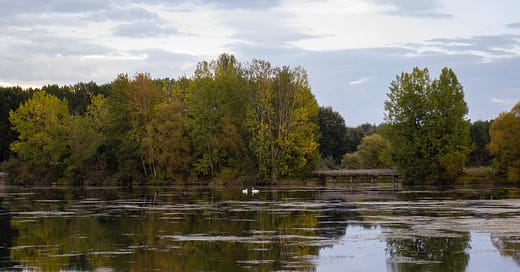They just started showing up one day, these strange, sad young women. I don’t remember exactly when but it must have been summer because the trees around the lake were thick and green, and wiry children were daring each other to swim through the perpetually glacial waters to the little island in the middle of the lake. We make sure to keep that island a mess in hopes of deterring them. It only seems to encourage them.
The first of the sad young women wandered out of the woods holding a large jar of honey and a small cloth satchel of coin, which I thought was a strange choice of items for a midsummer swim. Her simple blue petticoat was a bit shredded. The brambles in these woods are unforgiving. She stood between the edge of the trees and the gentle slope of the bank, looking around and fiddling with the satchel, and she had just started chewing on her long dark braid when another older person huddled under a deep green cloak—man or woman, I wasn’t sure—showed up. This person, whom we call “Bob,” because that’s what these women pay for the treatment, this person spoke to the young woman for about five minutes. I couldn’t hear what they were saying, nor did I try to listen in. I don’t typically concern myself with these things because, well, more often than not they’re either dreadfully boring or too much trouble. In any case, first the young woman was talking, then crying, and then she smiled and paid. Ten seconds later, she was a swan.
I’d never heard the sound of skin stretching and breaking and retracting before. There was a violent shudder through the young woman’s spine, and then she shriveled and shrieked as feathers broke through her arms and back and legs and torso. The bones in her face cracked, crumpled, and were re-shaped into a beak. Her neck became long, her feet webbed, her fingers melded and disappeared into the edge of a wing. Frankly, I thought it was quite an improvement. When it was done, she flapped once, tripped on her petticoat and fell face forward onto the shore.
The thing about being a swan is that it takes practice.
Flying, grooming, gliding, paddling, diving, preening- these are skills you have to develop. And what my friends and I have discovered in the last year or so, is that humans make terrible swans. They’re just bad at it. Granted, the ladies who pop out of the woods with their coin and their honey and their worried looks do get to spend some time on certain moonlit nights in their original form, splashing and giggling and shrieking like foxes in labor. These are our least favorite nights. And yet, lake life has improved dramatically since some of us old birds banded together to take these weird, weepy creatures under our tutelage.
We teach them all we know about being the graceful, magnificent, belligerent beings we are. And they teach us about the joys and miseries of being a mammal. We hear of their families, sensitive brothers, determined sisters, parents who embrace them, parents who strike them, loves and crushes and hatreds and what foods they miss the most. One particular swan-lady, whose name I think started with a Y, described cheese to me once. It confirmed my suspicions that humans are quite disgusting.
So when they tell me the part of their story that they’re most eager to forget, when they tell me it was a forced engagement, a violent partner, or sometimes a hateful stranger that drove them into the woods looking for the sorcerer, I don’t begrudge them their desire for wings.
Kate Ryan Brewer is an independent film director & screenwriter. Her first feature was a documentary about forced child marriage in the U.S. Brewer was born in Seattle, grew up in Sri Lanka and Indonesia, and currently lives in Tirana, Albania with her husband.
Fiction Attic Press seeks submissions of flash fiction and flash memoir. Go here to submit your work.





